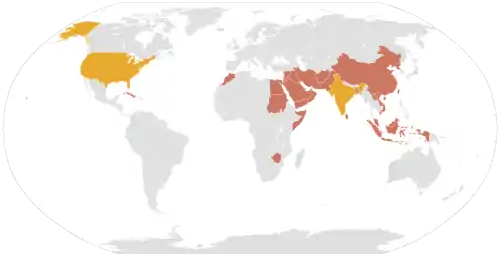اعدام برای قاچاق مواد مخدر
در برخی کشورها واردات، صادرات، فروش یا به همراه داشتن غیرقانونی مواد مخدر جرمی است که میتواند مجازات اعدام به همراه داشته باشد.

فقط تحت شرایط خاص
اعدام برای جرایم مرتبط با مواد مخدر
| اعدام |
|---|
کشورهایی که برای قاچاق مواد مخدر مجازات اعدام لحاظ کردهاند
| کشور | مجازات(ها) |
|---|---|
| این گزینه وقتی محکومیت دوم قاچاق اتفاق بیفتد وجود دارد.[1] | |
| [2] | |
| مقادیر خیلی زیاد یا مخلوط هروئین، کوکائین اکگونین، فنسیکلیدین، الاسدی، ماریجوانا یا متآمفتامین.[3][4][5][6] | |
نگارخانه
 هشدار کارت ورود به سنگاپور در خصوص مجازات اعدام مواد مخدر
هشدار کارت ورود به سنگاپور در خصوص مجازات اعدام مواد مخدر هشداری در خصوص مجازات قاچاق در تایوان.
هشداری در خصوص مجازات قاچاق در تایوان.
منابع
- Bombay High Court overturns mandatory death penalty for drug offences; first in the world to do so بایگانیشده در ۲۲ مه ۲۰۱۳ توسط Wayback Machine. June 17, 2011 by Lawyers Collective. "Consequently, the sentencing Court will have the option and not obligation, to impose capital punishment on a person convicted a second time for drugs in quantities specified under Section 31A. ... Across the world, 32 countries impose capital punishment for offences involving narcotic drugs and psychotropic substances."
- Moroccan man gets death for drug trafficking بایگانیشده در ۲۱ اکتبر ۲۰۱۳ توسط Wayback Machine. May 31, 2013. New Straits Times.
- The Federal Death Penalty Act of 1994. Criminal Resource Manual 69. United States Department of Justice - United States Attorneys' Office. "In passing this legislation, Congress established constitutional procedures for imposition of the death penalty for 60 offenses under 13 existing and 28 newly-created Federal capital statutes, which fall into three broad categories: (1) homicide offenses; (2) espionage and treason; and (3) non-homicidal narcotics offenses."
- The death penalty for drug kingpins: Constitutional and international implications. By Eric Pinkard. Fall, 1999. Vermont Law Review. "In 1994 Congress enacted the Federal Death Penalty Act (FDPA) with provisions permitting the imposition of the death penalty on Drug Kingpins. The FDPA is unprecedented in American legal history in that the death penalty can be imposed in cases where the Drug Kingpin does not take a human life." See also: Violent Crime Control and Law Enforcement Act, and the section on the Federal Death Penalty Act.
- 18 USC § 3591 - Sentence of death | Title 18 - Crimes and Criminal Procedure | U.S. Code. Title 18 of the United States Code. Legal Information Institute.
- Chapter 4: The Death Penalty for Non-Homicide Drug Trafficking? Kennedy v. Louisiana and the Federal Death Penalty Act بایگانیشده در ۱۵ نوامبر ۲۰۱۳ توسط Archive.today. By Seth Gurgel. From the book The Contemporary American Struggle with Death Penalty Law: Selected Topics and Cases. U.S. -China Death Penalty Reform Project of the U.S. -Asia Law Institute of NYU School of Law. A paragraph from it that summarizes things (emphasis added):
Making this discussion somewhat easier is the fact that in a recent case totally unrelated to drug trafficking (the case itself addressed the constitutionality of imposing the death penalty for rape of a child where no death occurs), Kennedy v. Louisiana, the U.S. Supreme Court conducted a detailed analysis of the distinction between crimes that do and do not take a human life and the relationship of each type of crime to the death penalty. Within this analysis, in a non-binding portion of the Court’s opinion (dictum), the Court drew an analytical line separating “offenses against the individual” from “offenses against the State. ” In its holding, the Kennedy Court stated that, at least within the category of “offenses against the individual,” the death penalty is unconstitutional for crimes that do not take a human life, because the punishment of death is “excessive” and “disproportionate” to the crime, pursuant to the Eighth Amendment’s prohibition on “cruel and unusual punishment. ” With respect to the other category, however – “offenses against the State” – including crimes such as drug trafficking (and treason and espionage), even when they do not result in a death, the Court left open the possibility that the death penalty might not be unconstitutionally “excessive” punishment.
- Methods of Execution. Death Penalty Worldwide project.
- Methods of Execution by Country - NutzWorld.com
- Death Penalty | StoptheDrugWar.org. Ongoing compilation of articles about countries sentencing people to death for drug offenses.
This article is issued from Wikipedia. The text is licensed under Creative Commons - Attribution - Sharealike. Additional terms may apply for the media files.